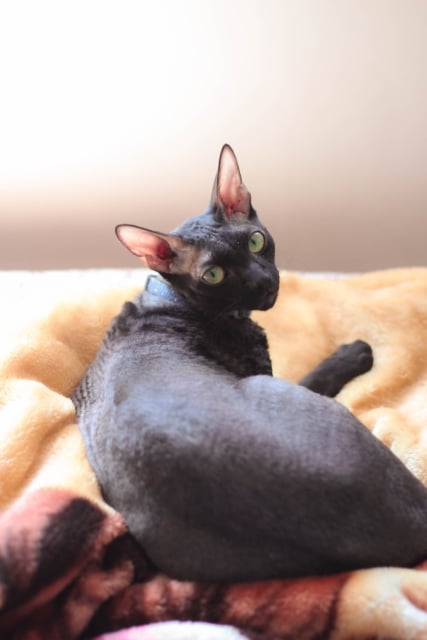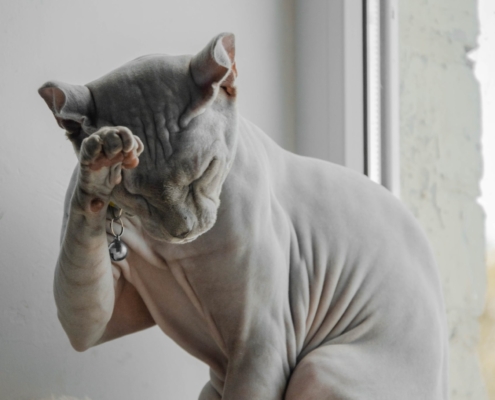Breed Name
Cornish Rex
Alternate Names
Poodle Cat

The Cornish Rex cat breed is truly one of a kind. With its distinctive appearance and playful personality, it has captured the hearts of cat lovers worldwide. In this article, we will delve into the mysteries surrounding this unique feline and explore its history, physical characteristics, personality traits, and health considerations. Whether you are a long-time enthusiast or a curious newcomer, prepare to be amazed by the fascinating world of the Cornish Rex.
History and Origin of the Cornish Rex
The story of the Cornish Rex begins in Cornwall, England, in the 1950s. It all started with a spontaneous mutation that gave rise to a curly-coated kitten named Kallibunker. Breeders were captivated by his unusual appearance and decided to breed him to preserve the unique trait. This marked the beginning of the Cornish Rex breed.
Over the years, breeders carefully selected cats with similar genetic makeup to maintain the breed’s signature curly coat. Although initially met with skepticism, the Cornish Rex gained recognition and popularity among cat enthusiasts. Today, they are cherished companions in households around the world.
Physical Characteristics of the Cornish Rex
The most striking feature of the Cornish Rex is its wavy coat. Unlike other cat breeds, their fur lacks the typical guard hairs, resulting in a soft, curly coat that resembles crushed velvet. This unique coat requires minimal grooming, making them a popular choice for individuals with allergies.
In addition to their coat, Cornish Rex cats have an elegant and slender build. They possess long, lean bodies with arched backs and high cheekbones, giving them a graceful and athletic appearance. Their large, expressive eyes are one of their most captivating features, often ranging in color from green to gold.
Personality Traits of the Cornish Rex
Cornish Rex cats are known for their playful and affectionate nature. They thrive on human company and enjoy being the center of attention. These extroverted felines are often described as “dog-like” due to their loyalty and desire to be involved in all household activities. They are highly intelligent and can be trained to perform tricks or play interactive games.
Their mischievous nature and boundless energy make them excellent companions for families with children or other pets. However, they do not appreciate being left alone for long periods and may become bored or anxious. Providing them with plenty of toys and interactive playtime is essential to keep them mentally stimulated and content.
Health Considerations for the Cornish Rex
While the Cornish Rex is generally a healthy breed, there are a few health considerations to be aware of. Due to their unique coat, they may be more susceptible to temperature changes and may require extra warmth during colder months. Additionally, their delicate skin is prone to sunburn, so it’s important to protect them from prolonged exposure to direct sunlight.
Another health concern for Cornish Rex cats is hypertrophic cardiomyopathy (HCM), a genetic heart condition that affects some individuals within the breed. Regular veterinary check-ups and screenings can help detect and manage this condition early on. Responsible breeding practices can also help reduce the prevalence of HCM within the breed.
Caring for a Cornish Rex Cat
Caring for a Cornish Rex cat involves providing them with a stimulating environment and meeting their unique needs. Regular play sessions and interactive toys are essential to keep them mentally and physically active. Their curly coat requires minimal grooming, but it’s important to gently brush them to remove any loose hairs and prevent matting.
Due to their high energy levels, providing them with vertical spaces such as cat trees or shelves can help satisfy their need to climb and explore. Creating a safe and enriching environment will ensure that your Cornish Rex remains happy and content.
Fun Facts about the Cornish Rex
- Cornish Rex cats are often referred to as the “greyhound of the cat world” due to their slender and athletic build.
- They are excellent jumpers and can effortlessly leap to great heights.
- The Cornish Rex coat is not hypoallergenic, but it produces fewer allergenic proteins, making it more tolerable for individuals with allergies.
- They have a unique purr that sounds like a combination of a cat’s purr and a pigeon’s coo.
- Cornish Rex cats have an exceptional sense of balance and can walk on narrow ledges or even stand on their hind legs.
Finding a Cornish Rex Cat Breeder or Rescue
If you have fallen in love with the Cornish Rex breed and are considering adding one to your family, it’s essential to find a reputable breeder or rescue organization. Start by researching local breeders who adhere to responsible breeding practices and provide proper care for their cats. Visiting the breeder’s facility and meeting the cats in person will give you a better understanding of their environment and their overall health.
Alternatively, consider adopting a Cornish Rex from a rescue organization or a shelter. Many purebred cats end up in shelters due to various circumstances, and adopting them provides them with a second chance at a loving home. Rescue organizations often have a screening process to ensure that the cat is placed in a suitable environment, so be prepared to answer questions about your experience with cats and your living situation.
Frequently Asked Questions about the Cornish Rex Breed
- Are Cornish Rex cats hypoallergenic?No, they are not hypoallergenic, but their coat produces fewer allergenic proteins, making them more tolerable for individuals with allergies.
- Do Cornish Rex cats require special grooming?Their curly coat requires minimal grooming, but regular brushing will help remove loose hairs and prevent matting.
- Are Cornish Rex cats good with children and other pets?Yes, Cornish Rex cats are generally excellent companions for families with children and other pets. They enjoy being part of the family and are known for their social and playful nature.
- How long do Cornish Rex cats live?On average, Cornish Rex cats have a lifespan of 12 to 15 years. With proper care and a healthy lifestyle, they can live even longer.
Conclusion
The Cornish Rex cat breed is a true marvel of nature. From their unique appearance to their playful personality, they never fail to captivate those who encounter them. Whether you are mesmerized by their curly coat or enchanted by their mischievous antics, the Cornish Rex is a feline companion like no other. By understanding their history, physical characteristics, and care requirements, you can embark on a journey of companionship and discovery with this extraordinary breed.
If you are ready to welcome a Cornish Rex into your home, take the time to research reputable breeders or rescue organizations. Remember, providing a loving and nurturing environment is essential for the happiness and well-being of your new feline friend.
If you enjoyed my article, I would appreciate you sharing it with your network.

Sima Ndlebe
Sima writes for CatBuzz. He is interested in Cats, Health and Fitness, and Entrepreneurship.
Published: 10 October 2023



